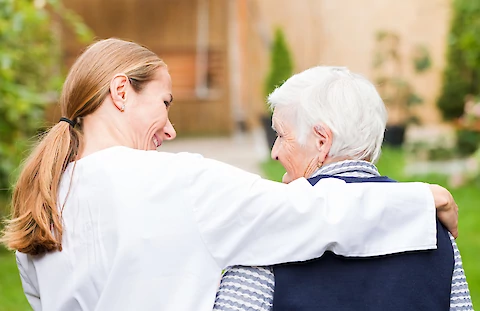
Many families care for their senior loved ones with Alzheimer's disease at home. As a result, caregivers can experience physical and mental stress that can lead to feeling overwhelmed, exhausted, and frustrated. Caregivers must find ways to cope emotionally during this challenging time to stay healthy mentally and physically. Educating yourself on the disease and the challenges of providing in-home care can help. This blog will provide some crucial information and offer tips on how to care for yourself, too.
Understanding Alzheimer's Disease
Alzheimer's disease is a progressive and irreversible brain disorder. It is the most common type of dementia. It affects 6.5 million people in the United States. Symptoms vary but can include memory loss, difficulty completing familiar tasks or speaking, confusion about time and place, misplacing things often, and changes in mood and behavior such as depression or anxiety, delusions, or hallucinations. These symptoms generally worsen over time as it progresses from the early to mid stages of Alzheimer's until the severe stage. Seniors with Alzheimer's may eventually become unable to care for themselves.
Alzheimer's progresses through three distinct stages: mild (early), moderate (mid), and severe (late). During each phase, symptoms will typically become more pronounced, requiring caregivers to adjust their approach accordingly. Care may change from providing companionship in the early stages to monitoring safety & addressing physical needs such as feeding & bathing in the later stages.
Tips for Caring for a Senior With Alzheimer's
When caring for someone with Alzheimer's, remember these tips:
- Encourage engagement. Maintain their hobbies and interests as much as possible & keep them engaged in activities that make them happy.
- Know what works. Understand which behavior will irritate or make them anxious & work towards avoiding those topics of conversation
- Keep structure. Set routine tasks such as eating at the same time each day & use organizers to organize items, so they are easier to find when needed.
Tips for Caring for Yourself as a Caregiver
Caring for a senior with Alzheimer's can bring physical & emotional stress. To prevent burnout, practice self-care and seek joy in difficult situations. Make time for yourself to do something that pleases you, such as reading, crafting, or taking a walk/hike outdoors. Be sure to focus on building your resilience by challenging negative beliefs and creating a strong support network of friends & family who will be there to listen when needed. Don't be afraid to seek professional help if any mental or emotional strife emerges. Psychologists & psychiatrists can offer helpful tips and treatments unique to each individual's symptoms.
We Support Seniors with Alzheimer's and Their Caregivers
Caregivers of seniors with Alzheimer's disease face complex challenges. Being educated on the disease, keeping structure & routine in the day-to-day, & taking time for self-care are three essential steps for caregivers to remain healthy and happy while performing their caregiving duties in tough times. If you or someone you know is a caregiver experiencing emotional stress from this experience, please do not hesitate to reach out to professional help who can provide support and treatment accordingly.
If you need more support caring for a senior with Alzheimer's, Senior Helpers of Reading can help. Contact us to learn more about our in-home senior services in Birdsboro, Mohnton, Morgantown, Newmanstown, Reading, Reinholds, Robesonia, and Wernersville.